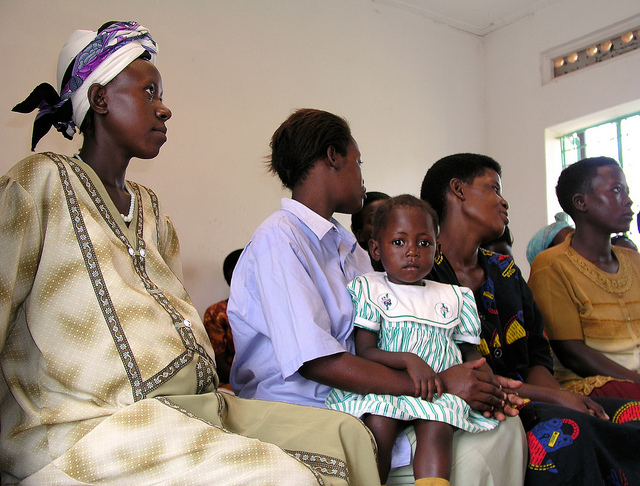Malaria in Pregnancy Treatment Efficacy Study Group
Malaria in Pregnancy Treatment Efficacy Study Group

Assessing the efficacy of a range of antimalarials used for the treatment of P. falciparum malaria in all trimesters of pregnancy in Africa and Asia
The MiP Treatment Efficacy Study Group Study Group was formed in July 2016. It started inviting potential collaborators in August 2016 and closed the study group invitation in July 2017. A number of pieces of work were carried out leading to publications:
- Optimal Duration of Follow-up for Assessing Antimalarial Efficacy in Pregnancy: A Retrospective Analysis of a Cohort Followed Up Until Delivery on the Thailand-Myanmar Border
- Methodology of assessment and reporting of safety in anti‑malarial treatment efficacy studies of uncomplicated falciparum malaria in pregnancy: a systematic literature review
- Systematic literature review and meta‑analysis of the efficacy of artemisinin‑based and quinine‑based treatments for uncomplicated falciparum malaria in pregnancy: methodological challenges
- Efficacy of artemisinin-based and quinine-based treatments for uncomplicated falciparum malaria in pregnancy: a protocol for systematic review and individual patient data (IPD) meta-analysis
- Efficacy and tolerability of artemisinin-based and quinine-based treatments for uncomplicated falciparum malaria in pregnancy: a systematic review and individual patient data meta-analysis
- Pregnancy outcomes and risk of placental malaria after artemisinin-based and quinine-based treatment for uncomplicated falciparum malaria in pregnancy: a WorldWide Antimalarial Resistance Network systematic review and individual patient data meta-analysis
About 60% of all pregnancies take place in malaria endemic areas [1]. In addition, pregnant women and children are the most vulnerable group for malaria infection leading to higher morbidity and mortality. Although studies on the efficacy of antimalarials have been conducted extensively, pregnant women have been excluded from the majority of clinical trials in the past, mainly because of safety concerns for the fetus. Due to the lack of evidence, quinine, rather than artemisinin combination therapy (ACT), has been recommended as the first-line treatment for pregnant women in the first trimester by the World Health Organization (WHO) [2]. However, recent studies measuring the efficacy and safety of artemisinin derivatives during pregnancy, including in the first trimester [3], have shown reassuring results [4]. ACT may be recommended as a first-line treatment option for pregnant women regardless of the trimester in the new WHO guideline [5]. As the current treatment recommendation for pregnant women is based on limited available data, vigorous and prompt assessment of efficacy in pregnancy is warranted [6][7]. The WorldWide Antimalarial Resistance Network (WWARN) has established an individual participant data (IPD) sharing platform. We are aiming to expand the platform to include both published and unpublished studies exploring the impact of malaria infection during pregnancy (MIP).
- Assessment of antimalarial efficacy in non-pregnant patients is standardised by the WHO guideline. There is no consensus on how this should be done in pregnancy which extends beyond 28 days. We will conduct IPD meta-analyses for the antimalarial treatments used for the treatment of P. falciparum MIP and explore techniques to measure the efficacy of antimalarials.
- We will describe long-term maternal and fetal outcomes after single and repetitive malaria P. falciparum infection and treatment in pregnancy.
- Prospective clinical efficacy studies of parasitologically confirmed uncomplicated falciparum malaria with a minimum 28 days follow up
- Information on name, date and dose of antimalarial drugs
- Baseline data on patient age, estimated gestational age or trimester of pregnancy (all trimesters will be included)
- Parasite density at day 0
- Information on the symptoms (both symptomatic or asymptomatic will be included)
- Genotyping to distinguish recrudescence and reinfection
- Gametocyte carriage
- Weight of the patient
- Information on the supervision of drug administration
- Number of days of symptoms before enrolment
- Haemoglobin (Hb) or haematocrit (Hct) measured on day 0
- Parity
- Gravidity
- Information on intermittent presumptive treatment (IPTp)
- Information on haematinics use
- Pregnancy outcomes
- Birth outcomes
After upload to the WWARN Data Repository, WWARN will standardise data sets according to the Malaria in Pregnancy Treatment Efficacy Study Group Statistical Analysis Plan and pool into a single database of quality-assured individual patient data.
Time to recrudescence will be assessed with or without adjusting for geographic location and known confounding factors. Risk factors for recrudescence, particularly antimalarial drug dose per body weight will be assessed. A detailed statistical analysis plan will be developed prior to the analyses and will be shared among data contributors beforehand.
The Study Group comprises participating investigators who contribute relevant data sets to the pooled analysis. Data sets will remain the property of the investigator. The Study Group collectively makes decisions with respect to including additional studies, data analysis and plans for publication, in line with the WWARN Publication Policy. The Study Group will identify one or two people to coordinate activities including data analysis, and drafting of publications and reports for group review. Dr Rashid Mansoor and Dr Makoto Saito will be responsible for statistical analyses.
For further information, contact wwarn@wwarn.org
- Dellicour S, et al. Quantifying the number of pregnancies at risk of malaria in 2007: a demographic study. PLoS Med 2010;7:e1000221. doi:10.1371/journal.pmed.1000221. PMID: 20126256
- World Health Organization. Guidelines for the treatment of malaria. - 3rd edition. Geneva: World Health Organization; 2015.
- Moore KA, et al. Safety of artemisinins in first trimester of prospectively followed pregnancies: an observational study. Lancet Infect Dis 2016;3099:1–8. doi:10.1016/S1473-3099(15)00547-2. PMID: 26869377
- The PREGACT Study Group. Four Artemisinin-Based Treatments in African Pregnant Women with Malaria. N Engl J Med 2016;374:913–27. doi:10.1056/NEJMoa1508606. PMID: 26962727
- Recommendations on intermittent screening and treatment in pregnancy and the safety of ACTs in the first trimester. Malaria Policy Advisory Committee Meeting, WHO. Geneva: 2015. Available at http://www.who.int/malaria/publications/atoz/istp-and-act-in-pregnancy.pdf
- Burger RJ, et al. Artemisinin-Based Combination Therapy Versus Quinine or Other Combinations for Treatment of Uncomplicated Plasmodium falciparum Malaria in the Second and Third Trimester of Pregnancy: A Systematic Review and Meta-Analysis. Open Forum Infect Dis 2016;3:ofv170. doi:10.1093/ofid/ofv170. PMID: 26788543
- Tagbor H, et al. Antimalarial drug combinations for treating uncomplicated malaria in pregnancy. Cochrane Database Syst Rev 2015;8. doi:10.1002/14651858.CD011832.



